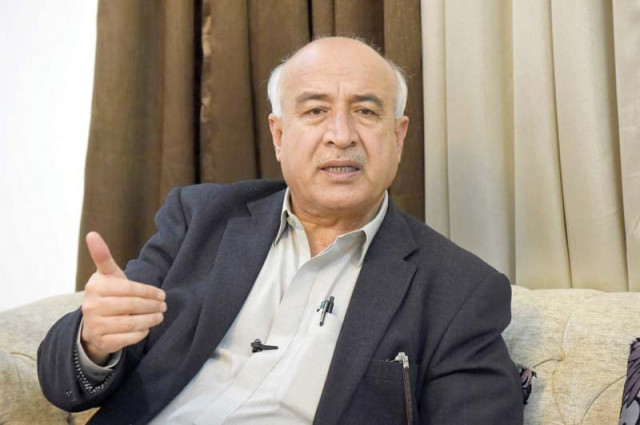Dr Malik bemoans ‘culture of negativity’ in Balochistan
Says his party’s minority status stood in the way of ‘revolutionary changes’

Abdul Malik Baloch. PHOTO: FILE
Dr Malik’s National Party had made a coalition with the Pakistan Muslim League-Nawaz and Pashtoonkhwa Milli Awami Party as a result of a power-sharing agreement after the 2013 general elections. According to the Murree deal, as it is officially called, Chief Minister Dr Malik has to step down mid-way through his five-year tenure to make way for another chief minister from PML-N.
Dr Malik is aware of his limitations as leader of a minority party. Without a majority in the house, he has no other option but to share his powers with his coalition partners. Notwithstanding these problems, he is optimistic about the future of Balochistan.

In an exclusive interview, the chief minister referred to a ‘class of opportunists’ in Balochistan that favours the status quo and creates troubles whenever the government tries to improve things in the province. “We have to put an end to the status quo,” he said.
“I wouldn’t call myself a revolutionary. I can’t claim to be in a position to bring about revolution in the province, but this situation has to change. Political parties must be allowed to consolidate their powers, not these individuals.”
He said members of this class of opportunists are present in the bureaucracy and the establishment, and among political parties and intellectuals.
Responding to a query on enforced disappearances, he said: “There is progress in this regard, and I would say the circumstances have improved.”
Dr Malik also claims a marked improvement in the overall security situation in the province compared to over two years ago when he assumed the chief minister’s office. “Police were nowhere to be seen. The Levies were restricted to their homes. Police stations were not functional. The highways from Quetta to Karachi and Quetta to Jacobabad were unsafe for travel. Kidnappings, suicide bombings and sectarian killings were on the rise,” he said about the time he became the CM.
However, recent statistics show a marked improvement. “There has been a huge decline in sectarian violence and other killings. Our highways are far safer than before. There has been a reduction in the number of cases of kidnapping for ransom. The dumping of bodies has also decreased.”
He admits that while the current situation is far from ideal, there is a lot of work to be done to make significant progress.
He pointed towards the separatist insurgency as another grave problem for the province, but said his government has made progress in this regard as well. He claimed credit for convincing many militants to agree to hold talks with the administration. Asked how the government would respond to statements of the self-exiled Baloch leaders who have shown flexibility towards negotiations, Dr Malik said stabilising the situation will take time.
As for regrets about his term in office, he said he wanted to introduce reforms in education and health sectors, and alleviate poverty. “It will take time, but we shall continue our struggle to improve things.”
Regarding mega projects, the chief minister said his government was committed to keeping all promises and agreements made with international firms. “The Reko Diq project, however, is an exception. We had to go to international arbitration because the agreement was not in accordance with the wishes and interests of the people of Balochistan. We shall welcome investors here and provide them a legal cover.”
He sees the province’s prosperity hinging on the fate of democracy in Pakistan. “Balochistan will progress economically and socially, and will be in a better shape if democracy is sustained.”
Another major concern for Dr Malik is the groundwater table, which is falling at an alarming level in Balochistan. There are fears of migration from Quetta to Khuzdar if dams are not constructed to conserve water. “We have taken up the groundwater issue on a war footing. We shall request more grants and money from the federal government, and urge prompt completion.”
On the Gwadar-Kashgar economic corridor, he said: “The federal government agreed on the western route and has started work on it. However, there are always politics involved.”
He said that before the year-end, construction of the Gwadar International Airport will begin, while work on the coastal highway connecting it with the rest of the country is already under way. “Moreover, a 500-acre processing zone has been established where teachers, journalists, doctors and officials can visit to improve their knowledge and understanding of culture.”
About development and security issues, the chief minister said he and federal minister Hassan Iqbal will accompany a larger delegation of Chinese officials to Gwadar to deliberate on these matters. “All the issues will be thoroughly discussed and a future course of action will be decided.”
Published in The Express Tribune, November 16th, 2015.



















COMMENTS
Comments are moderated and generally will be posted if they are on-topic and not abusive.
For more information, please see our Comments FAQ